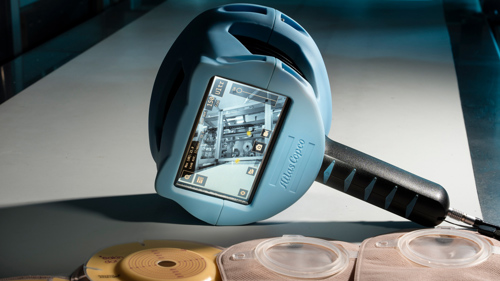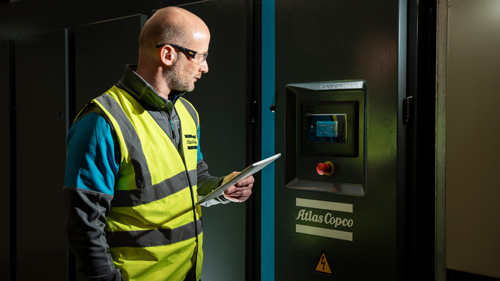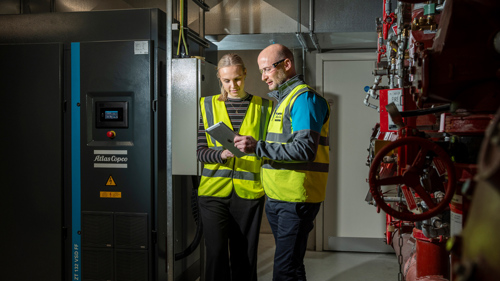Atlas Copco Compressors has helped medical supplies manufacturer Eakin Healthcare to significantly improve the quality and efficiency of the compressed air supply at their manufacturing site in County Down, Northern Ireland. Atlas Copco supplied a new oil-free compressor and undertook a leak detection audit at the site, which identified the potential to reduce carbon dioxide emissions by almost 5,000kg pa and reduce energy costs by over £4,000 pa.
Clean environment

Eakin Healthcare manufactures and supplies products to meet the needs of patients and clinicians within ostomy and wound, respiratory and surgical therapies. Compressed air is not only essential for general production machinery control and product conditioning, but also for powering the air knives that maintain the aseptic conditions that are critical for medical-grade products. The installed system operates at 7.4 bar.
The company is experiencing growth in demand, and a planned extension to its facilities meant that a new compressor was required. Atlas Copco worked with Edward Norton, Electrical and Mechanical Maintenance Engineer at Eakin’s County Down site, to identify the best solution. An Atlas Copco ZT 132 VSD compressor was selected to meet the increased demand for compressed air. Crucially, its oil-free operation ensures that the air supplied is clean and free of contaminants that could otherwise compromise the sterile products being manufactured.

Improving sustainability
Although their facilities are modern and the compressor is new, Eakin Healthcare opted to add leak detection to their Atlas Copco service plan. “Eakin Healthcare is committed to achieving net zero by 2045 and energy efficiency is a key focus for our sustainability efforts. So, once the new compressor was in place, sized to our air consumption requirements, we wanted to get a clear understanding of our compressed air network and identify any areas for improvement,” says Ed Norton.
The main purpose of an air leak detection test is to build a profile of the energy wasted through air leakage within a compressed air system. Locating, logging, quantifying and costing air leaks enables compressed air users such as Eakin Healthcare to prioritise the remedial work required to reduce energy costs, leading to a reduction in carbon footprint.
Leak detection
Leaks in compressed air systems can be caused by many issues including corrosion, poor pipe connections and poorly specified or degraded seals. Without investigation, these problems can add up to a significant amount of wasted energy over time, resulting in higher bills and higher environmental impacts.

Ben Williams, Sales Engineer for Atlas Copco in Northern Ireland says: “It is easy to assume that compressed air systems are running efficiently, particularly in factory settings where leakage cannot be easily heard or observed. However, for optimum efficiency, it is important to check regularly and keep the network well-maintained.”
Atlas Copco uses a state-of-the art acoustic leak detection camera to analyse the compressed air network. It operates without interrupting plant operation and reaches system areas that are hard to access to locate all air leaks. It can even detect tiny leaks that would be inaudible to the human ear. The results are presented in a leakage report that accurately identifies the position of each leak and prioritises them by size and cost so that maintenance can be targeted accordingly.
Audit outcomes
The leak detection audit at Eakin Healthcare in County Down identified 16 separate leaks, totalling an air loss of 286.9 litres per minute. The most severe leak caused by a split pipe, was responsible for six per cent of the total air losses (98.9 l/min and £1,430 per year). Other medium and small leaks were typically the result of deterioration in push fittings and connectors.
The additional power required by a compressor to compensate for leakage can quickly add up. Power loss is dependent on the size of the hole. A pinprick of around 1mm diameter represents an additional 0.3kw of power, while a larger hole of 10mm diameter represents an additional 33kw.

Atlas Copco calculated that the total air losses at Eakin Healthcare equated to £4,147 per year (at a cost of £0.22 per kWh) on the company’s energy bill. Most required only simple repairs that could be carried out without stopping production, offering the company a quick financial win. In terms of sustainability, eliminating all the leaks represents a reduction in carbon dioxide emissions of 4818kg. This is a significant contribution to the company’s sustainability goals.
Ed Norton concludes: “The leak detection audit by Atlas Copco has proved invaluable. It has helped us improve our operational efficiency, reduce energy costs and improve our sustainability, which is a great return on investment.”
For more information on Atlas Copco’s leak detection audits, please click here
For more information on Eakin Healthcare’s sustainability commitment and net zero goal, please click here











National Gas receives funding to develop Gravitricity underground hydrogen storage system
One single rock salt mine - Winsford - has 23 <i>MILLION </i>cubic metres of void and even allowing for 10% of that void set aside for hazardous waste...